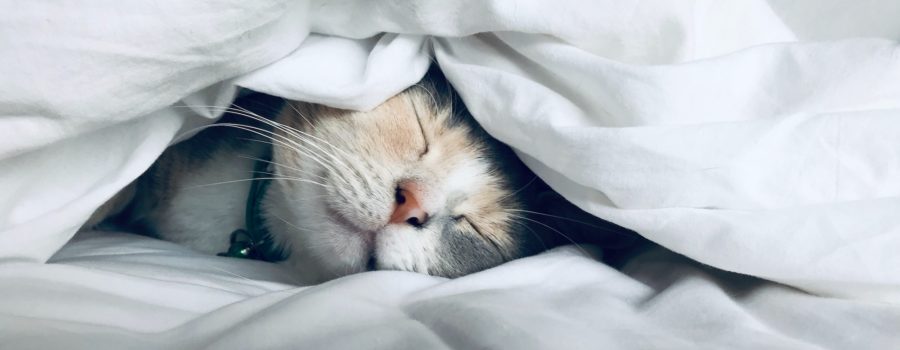By Kira Wiggins, Marriage and Family Therapist Trainee
I really want to watch this latest series on Netflix, but I can’t seem to keep my eyes open. After knocking my head on the back of the couch for the fourth time, I give up. I guess I’ll just go to bed. I rinse out my empty wine glass, brush my teeth, and turn out the lights. Excited for the well-deserved rest I’m about to receive, I climb into bed and wait for sleep to come. I wait… and wait… and wait some more. I was so tired just a minute ago, but now my mind won’t shut off and the highly anticipated drift into dreamland eludes me.
This frustrating scenario is one I hear far too often in the counseling room. It’s either this or we do get caught up in the series or the computer/phone and can’t stop engaging, suddenly realizing it’s past midnight. Or maybe you’re more familiar with the mind that decides to become highly productive at three in the morning, waking you up with its brilliance. Often, though, we just try to fit too much into each day, extending ourselves far into the night with our to-do list.
I speak here of the regular, everyday sleep deprivation that has become a standard part of modern life. But what has changed as our lives have been turned upside down with the stress and worry of current world events, quarantine, and, for many of us, schedules that have been completely disrupted?
The toll of sleep deprivation
There are multiple aspects of contemporary living that deprive us of the sleep we need, but sleep has increased importance in our lives now more than ever. Thanks to Matthew Walker and his team at UC Berkeley (Krause, et al., 2017), we have a pretty good understanding of the toll sleep deprivation takes on our bodies and brains. Some of these disturbing effects include lapses in attention and memory along with higher rates of risk-taking, sensation seeking, and impulsivity. We also see increases in irritability, emotional volatility, anxiety, and aggressive behavior.
Unfortunately, sleep deprivation often precedes suicidal ideation, suicide attempts, and suicide completion. Lack of adequate z’s has also been linked to the development and/or maintenance of addictive disorders, disrupted appetite regulation, food choice selection, and metabolic changes contributing to obesity.
Basically, without enough sleep, we become unproductive, unpleasant, and unhealthy individuals. Is anyone in your quarantine family (maybe yourself) who is not getting enough sleep displaying some of these behaviors? If so, paying attention to good sleep hygiene may be of special importance. Time to turn our attention to tips and tools for getting better sleep.
Take time for mental processing
Throughout the day, we’re constantly being stimulated through external sources. The mind must process all of this input and decide what to do with it. If we don’t provide the opportunity to do that throughout the day, our mind will take the opportunity at night when we stop the stimulation. This is why we lay in bed exhausted, yet unable to find sleep. A few of the things we can do through the day to give our mind time to digest what it has been fed include:
- Journaling
- A quiet walk
- Meditation
- A warm bath
- Quiet time in nature (this can be in your backyard or patio as long as it’s a peaceful space)
- Watching the sunset
Get physical activity
Have you ever noticed a day that included extra physical activity was followed by a very restful night’s sleep? There are multiple components to this phenomenon:
- The time spent on your activity provided the time for mental processing.
- The extra movement metabolized your stress hormones, blunting the behavior activation and fight or flight response your body has been engaging in (see “Surviving Stressful Times” in this series).
- Physical exhaustion requires sleep for the renewal of the energy used up during the activity.
It’s still possible to flex those muscles and raise your heart rate while in quarantine:
- Stream exercise classes on your television/computer
- Take a walk (keeping social distance)
- Turn up the music – Dance Party!
- Gardening
Keep a consistent sleep schedule
Our bodies adjust to a typical sleep and wake time. They prepare for sleep at our “usual” bedtime and will be ready to wake up at our “usual” waking time. You may have noticed this on weekends when you push to stay awake later with the idea that you’ll sleep in the next morning, — but when the sun rises, so do your eyelids. Some people are more sensitive to this than others, but generally we all do better when our sleep and wake times stay consistent throughout the week and weekend.
Create darkness
Studies have found even the slightest amount of light in the room we are sleeping in has an impact on the amount of melatonin our system will produce. This includes the digital clock, the light outside your window, or the tiny power light on a plug in your bedroom. Less melatonin means less deep sleep and less repair and rejuvenation of your body. Become a light detective and be sure your sleep space is completely dark.
Create a sleep preparation routine
Setting up a sleep preparation routine will not only aid in a restful night’s sleep, but will also help with overall stress and anxiety management. There are several steps to this self-care routine. It may be easiest to start with one that appeals to you and slowly add steps one-by-one until you have a full ritual to look forward to at the end of each day.
Thirty to sixty minutes prior to bedtime, turn off all screen devices
This includes television, computer, phone, tablets, etc. Turn the lights down low or limit lights to candlelight. Our body uses internal light sensors that detect when night is falling by the orange hue in the air and the darkness that follows. This signals the production of melatonin, our most powerful sleep hormone and naturally produced antioxidant (see “Surviving Stressful Times” in this series). These light sensors also detect when the day is dawning by the blue hue in the atmosphere and the sunlight that follows. This signals melatonin production to stop. The problem with artificial lighting and screen devices is that they usually produce blue light and, therefore, signal our system to be awake. Because of this, we find ourselves deficient in melatonin, leading to difficulty falling asleep and/or unrestful sleep.
Take a warm bath or shower
The warm water will help relax your muscles and nerves while taking this quiet time to yourself will provide the space for your mind to do some of its processing. For added pampering, incorporate sleep-promoting essential oils such as lavender, vanilla, rose, geranium, and jasmine. You may wish to massage the oil into your skin before showering or add it directly to your bath water.
Enjoy a small cup of spiced warm milk
Warm milk with a pinch of cardamom, nutmeg, and honey works as a sedative and digestive aid. The sedative effects are strongest with cow’s milk, but milk alternatives are also quite nice.
Recipe:
- Place 4 ounces of the milk of your choosing in either a small saucepan or milk warmer/frother
- Add a pinch of cardamom and a pinch of nutmeg
- Heat the milk and spice mixture just until it begins to steam, stirring frequently
- Pour the milk into your favorite cup and add honey to taste
- Stir and sip slowly
Stretch out kinks in the neck, shoulders, back and hips
Simple movements will help bring comfort in the body and relieve tension built-up throughout the day. Try this simple sequence:
Practice your breath
Alternate nostril breathing soothes the nervous system and calms the mind. Sit in a comfortable upright position with shoulders relaxed. Take a full inhale and exhale, then follow these steps:
- With one of your fingers, close the right nostril and inhale
- Move your finger to the left nostril and exhale through the right
- Keep your finger where it is and inhale through the right
- Switch your finger to block the right nostril and exhale through the left…you just completed one round!
Continue for 2-5 minutes and enjoy the quiet you find in your mind.
Legs up the wall
The final step in our bedtime routine includes relaxing on your back with your legs up a wall. This can be accomplished on the floor or on your bed if it buts up against a wall. The benefits of spending 5-10 minutes in this position before hitting the pillow include:
- Soothing the swollen or cramped feet and legs your day of running around may have caused
- Relaxing the pelvic floor
- Lowering the heart rate
- Inducing relaxation
- Reducing anxiety
For added benefit, add an extended exhale to your breath while you relax with your legs up the wall.
Our team at the Ventura Counseling & Wellness Center is offering private telehealth appointments with our therapists and virtual groups. Get in touch with us to learn more.
Kira is a Marriage and Family Therapist Trainee at Ventura Counseling and Wellness Center and West Valley Counseling Center. She combines her background as a registered dietitian and yoga therapist to her counseling for a holistic approach to your health and wellbeing.





